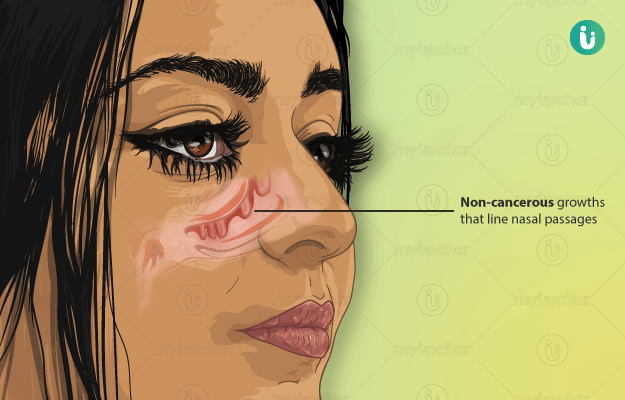What are nasal polyps?
Nasal polyps are the soft, painless, sac-like noncancerous, growths in the lining of your nose or sinuses. They are generally harmless, but if left untreated, they may block your nose and cause difficulty breathing. This condition affects about 4% of the population. The possibility of developing a polyp is between one and 20 out of 1,000 individuals, and it further declines after the age of 60.
What are its main signs and symptoms?
The symptoms of nasal polyps are as follows:
- Blocked or stuffy nose (Read more: Nasal congestion treatment)
- Runny nose
- Sneezing
- Loss of smell
- Loss of taste
- You may get a headache if you have a sinus infection
- Pain and pressure sensation in areas over the sinus or upper teeth
- Nosebleeds
- Snoring
What are its main causes?
The exact cause of this condition is unknown, but a person is at a higher risk of getting nasal polyps if he/she has any of the following conditions:
- Cystic fibrosis
- Asthma
- Hay fever
- Allergies
- Long-term sinus infections
- Aspirin sensitivity
How is it diagnosed and treated?
Diagnosis of nasal polyps involves the following:
- Physical examination of your nasal passage. Polyps are visible as an outgrowth in the nasal cavity.
- A CT scan of your sinuses that gives the image of the nasal passage. Polyps are seen as cloudy spots. Older polyps can sometimes lead to breaking of the bones inside the sinuses.
Medicines relieve the symptoms but do not cure the condition. The following medicines are commonly prescribed for the treatment of nasal polyps:
- Nasal steroids and corticosteroid pills or liquids to shrink the polyps and clear the nose
- Medicines for allergies
- Antibiotics for infections
In conditions where medicines are ineffective or when the polyps are large, surgery may be necessary to provide relief from the symptoms. Endoscopic sinus surgery is commonly performed for treatment of nasal polyps.

 Doctors for Nasal Polyps
Doctors for Nasal Polyps  OTC Medicines for Nasal Polyps
OTC Medicines for Nasal Polyps



















